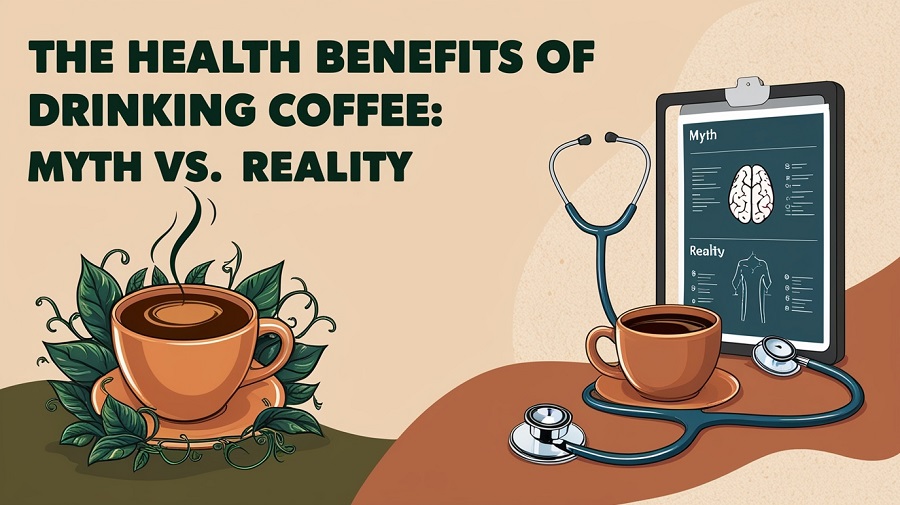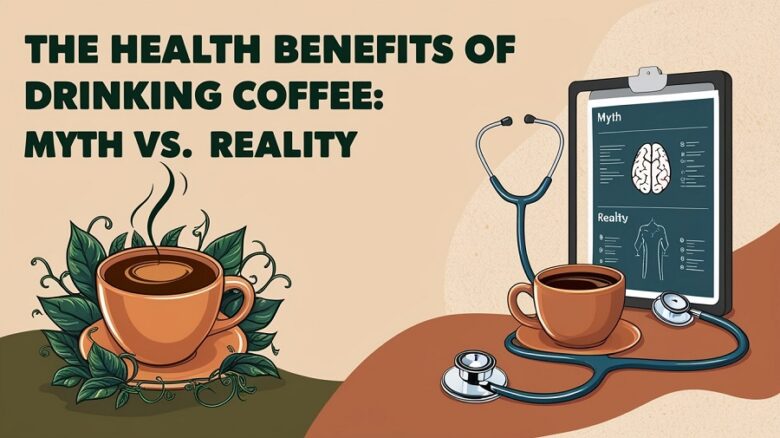There is no doubt that coffee is one of the most popular drinks around the world and is loved by people not only because of its taste but also for its health benefits. But health trends and diet and coffee’s role in wellness has become a very heated debate.

Some people like it as a powerful antioxidant-rich while other people don’t drink it because of its risks. In this guide we’ll explore the coffee’s impact on health and will debunk the myths that are revolving around coffee and will show what the reality actually is.
What Are the Real Health Benefits of Coffee?
1. Coffee Can Improve Your Cognitive Function
Benefit:
Coffee contains caffeine which is a natural booster that can increase cognitive function of our body including memory, focus and reaction time.
Mechanism:
The caffeine helps to block adenosine which is a neurotransmitter that promotes sleep and leads to increased alertness. That’s how it improves your cognitive function.
2. Coffee Can Also Reduce Risk of Certain Diseases
Type 2 Diabetes:
Regular coffee consumption is associated with a lower risk of developing type 2 diabetes. The antioxidants and other bioactive compounds in coffee are very useful and can help us to improve insulin sensitivity.
Parkinson’s Disease:
Studies have shown that caffeine consumption can reduce the risk of Parkinson’s disease by protecting neurons that produce dopamine.
Alzheimer’s Disease:
Drinking coffee can be very useful as it also lowers the risk of Alzheimer’s disease which is due to its ability to protect against neurodegenerative conditions.
3. Moderate Coffee Consumption Can Improve Heart Health
Benefit:
Moderate coffee consumption (more than 3-5 cups per day) has been linked to a reduced risk of heart disease and stroke. If it’s consumed moderately then you can have a lower risk of heart diseases.
Mechanism:
The antioxidants in coffee helps to reduce inflammation in our body and improve blood vessel function which can protect against cardiovascular diseases.
4. It Also Improves Liver Health
Benefit:
Coffee has been associated with a lower risk of liver diseases including liver cancer, cirrhosis and non-alcoholic fatty liver disease (NAFLD).
Mechanism:
Coffee’s anti-inflammatory and antioxidant properties help the body to protect the liver from damage and reduce the accumulation of fat.
5. Coffee Is Linked With Lower Risk of Depression
Benefit:
Regular coffee consumption has been linked to a lower risk of depression which can be found in more than 280 million people out of the total population and a reduced risk of suicide.
Mechanism:
Caffeine’s booster effects on the central nervous system and boost your mood and may help your body to produce neurotransmitters like serotonin and dopamine.
6. Coffee Can Improve Your Physical Performance
Benefit:
Caffeine can increase adrenaline levels which can improve your physical performance particularly in endurance activities.
Mechanism:
By mobilizing fatty acids from fat tissues, caffeine provides a source of energy during physical exertion.
7. Coffee Has Many Antioxidant Properties
Benefit:
Coffee is rich in antioxidants and helps fight free radicals in our body and reduce oxidative stress which is a major factor in aging and many chronic diseases.
Sources:
The polyphenols and other compounds in coffee contribute to its high antioxidant activity.
What Myths Surround the Consumption of Coffee?
1. Myth: Coffee Causes Dehydration
Reality:
While caffeine is a mild diuretic which means it can increase urine production the water in coffee more than compensates for this effect. Research shows that coffee contributes to daily fluid intake and does not cause dehydration when consumed in moderate amounts.
2. Myth: Coffee Stunts Growth
Reality:
There is no scientific evidence or proof to support the idea that coffee affects growth in children or teenagers. This myth originated from concerns about caffeine’s effects on calcium absorption but now studies have shown that moderate coffee consumption does not impact bone health in our body.
3. Myth: Coffee Increases the Risk of Heart Disease
Reality:
Earlier studies suggested a link between coffee and heart disease but more now it has been found that moderate coffee consumption may actually reduce the risk of heart disease. The antioxidants in coffee can have protective effects on the cardiovascular system.
4. Myth: Coffee Causes Insomnia
Reality:
Caffeine can interfere with sleep if consumed too close to but moderate coffee consumption in the morning or early afternoon is unlikely to cause insomnia. The body metabolizes caffeine over several hours and individual sensitivity to caffeine varies.
5. Myth: Coffee Is Addictive
Reality:
Caffeine dependence can develop in some people which can lead to mild withdrawal symptoms like headaches or irritability when consumption stops suddenly. But this is not the same because true addiction involves compulsive behavior despite harmful consequences. Most people can consume coffee regularly without developing a harmful dependence.
6. Myth: Coffee Causes Cancer
Reality:
Concerns about coffee and cancer have been largely debunked by scientific research. In fact coffee is now believed to reduce the risk of certain cancers including liver and colorectal cancer due to its high antioxidant content.
7. Myth: Coffee Is Bad for Your Bones
Reality:
The idea that coffee leads to osteoporosis or weak bones stems from concerns about calcium loss due to caffeine. But studies show that moderate coffee consumption does not significantly affect bone density especially when calcium intake is adequate.
Conclusion:
Coffee has many health benefits like it is rich in antioxidants and is also linked to numerous health benefits such as improved cognitive function and reduces the risk of certain diseases. But it’s important to look at these claims with a balanced perspective because excessive consumption of coffee can lead to negative side effects like anxiety, insomnia and digestive issues and can damage our body in many ways that’s why we should consume coffee in a moderate amount.




